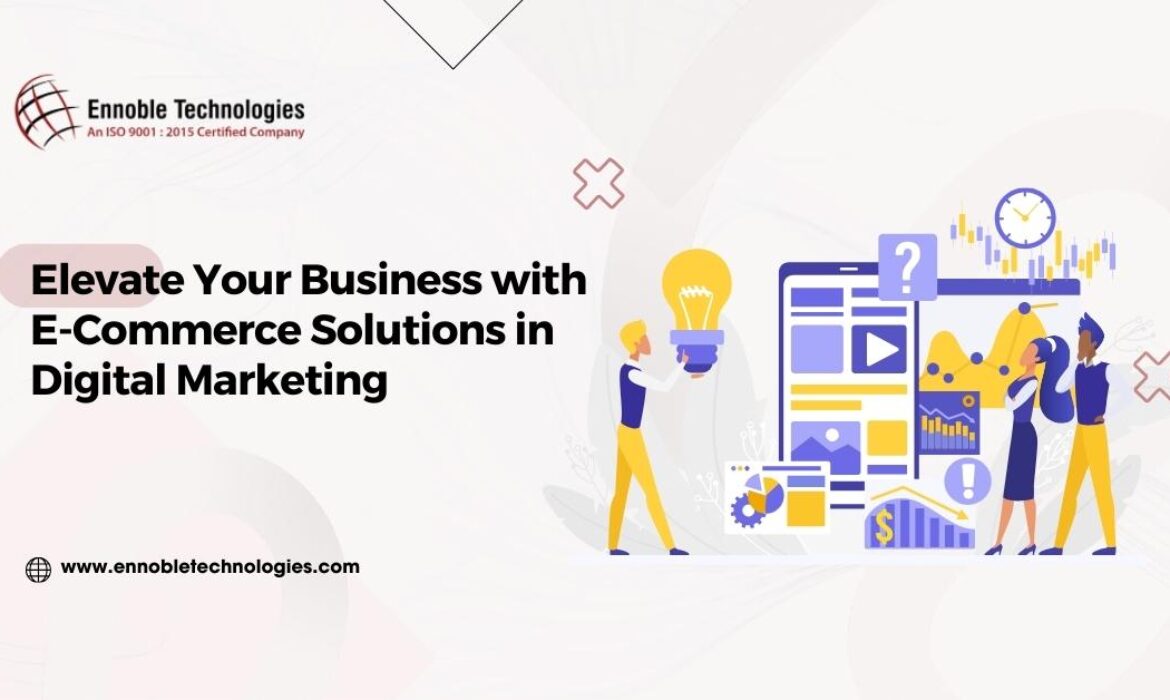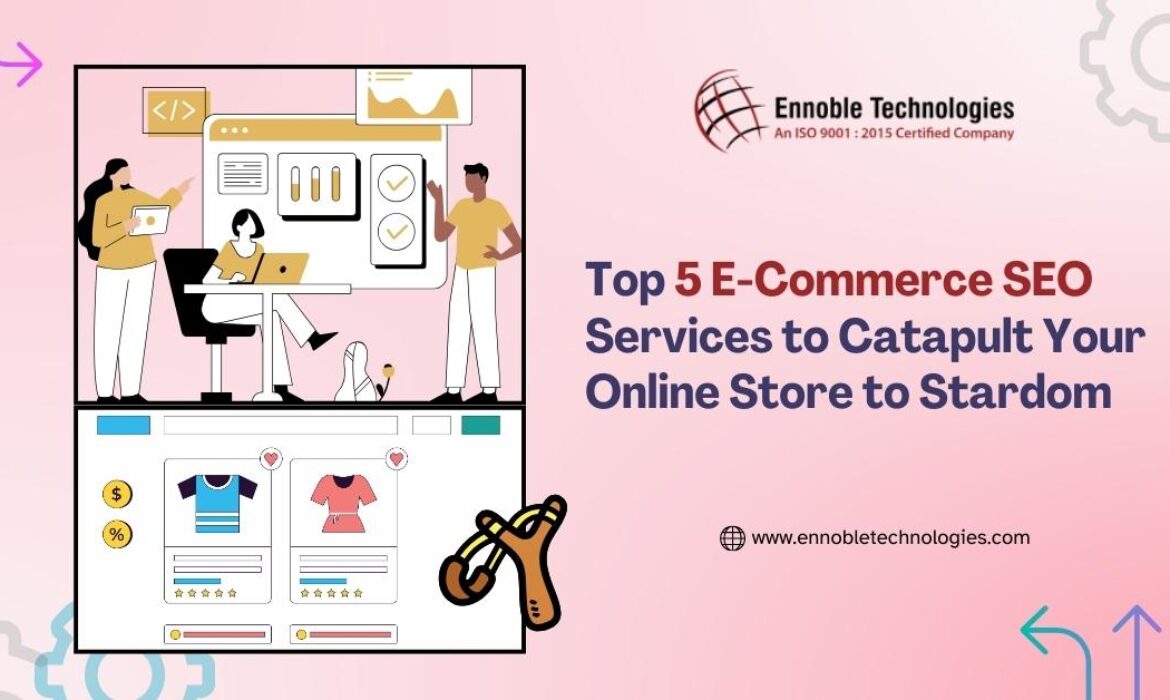Elevate Your Business with E-Commerce Solutions in Digital Marketing
In the fast-paced world of digital marketing, businesses are constantly seeking innovative ways to reach their target audience and drive growth. E-commerce has emerged as a powerful tool that not only expands the reach of businesses but also enhances customer experience. In this comprehensive guide, we will explore the dynamic realm of e-commerce and how it can elevate your business in the digital marketing landscape.
Understanding E-Commerce
Defining E-Commerce
E-commerce, short for electronic commerce, refers to the buying and selling of goods and services over the internet. It has revolutionized the way businesses operate, enabling them to reach a global audience with the click of a button.
Types of E-Commerce Models
B2B E-Commerce: Business-to-business e-commerce involves transactions between businesses. This model is often characterized by bulk orders and long-term partnerships.
B2C E-Commerce: Business-to-consumer e-commerce focuses on selling products and services directly to individual consumers. It’s the most common e-commerce model.
C2C E-Commerce: Customer-to-customer e-commerce platforms enable individuals to buy and sell products among themselves. Online marketplaces facilitate these transactions.
M-Commerce: Mobile commerce is the subset of e-commerce that occurs on mobile devices, such as smartphones and tablets.

The Evolution of E-Commerce
E-commerce has come a long way from its inception in the 1990s. From basic online catalogs to sophisticated, AI-driven shopping experiences, it continues to evolve, presenting new opportunities and challenges for businesses.
Why E-Commerce is Crucial in Digital Marketing
Expanding Your Reach
E-commerce erases geographical boundaries, allowing your business to reach customers worldwide. With the right digital marketing strategies, your products can find their way to consumers across the globe.
24/7 Availability
Unlike traditional brick-and-mortar stores with fixed operating hours, e-commerce platforms are open 24/7. This accessibility ensures that potential customers can shop at their convenience.
Cost-Effectiveness
Running an e-commerce store is often more cost-effective than maintaining a physical retail space. There are no rent, utilities, or other overheads to worry about.
Personalization and Customer Experience
E-commerce platforms can collect data on customer preferences and behavior. This data can be used to create personalized shopping experiences, making customers feel valued and understood.
Setting Up Your E-Commerce Store
Choosing the Right E-Commerce Platform
Selecting the appropriate e-commerce platform is crucial. Options like Shopify, WooCommerce, and BigCommerce offer varying levels of customization and scalability.
Design and User Experience
A well-designed e-commerce site with a user-friendly interface is more likely to convert visitors into customers. The visual appeal and ease of navigation are vital.

Product Listings and Descriptions
Compelling product listings with high-quality images and detailed descriptions are essential to attract and retain customers.
Payment Gateways and Security
Secure payment gateways and data encryption are paramount to protect both your business and your customers. Trust is a critical factor in e-commerce.
E-Commerce SEO Strategies
The Importance of SEO in E-Commerce
Search engine optimization (SEO) plays a critical role in e-commerce success. It’s the art of optimizing your website to rank higher in search engine results.
Keyword Research for E-Commerce
Thorough keyword research helps identify the terms and phrases potential customers are searching for. These keywords can then be strategically incorporated into your content.
On-Page SEO for E-Commerce
On-page SEO involves optimizing individual pages on your website. This includes optimizing product descriptions, meta tags, and images.
Off-Page SEO for E-Commerce
Off-page SEO focuses on building quality backlinks and promoting your e-commerce site on other websites and platforms.
Technical SEO for E-Commerce
Technical SEO ensures that your website functions smoothly and that search engines can crawl and index it effectively.
Content Marketing for E-Commerce
The Role of Content in E-Commerce
Compelling content can inform, entertain, and persuade customers. It’s a valuable tool for e-commerce businesses to engage their audience.
Blogging for E-Commerce
Maintaining a blog can help drive traffic and establish your brand as an authority in your niche.

Product Descriptions and Content
Detailed and persuasive product descriptions can make the difference between a sale and a lost opportunity.
Email Marketing for E-Commerce
Email marketing is a powerful way to stay connected with customers, promote products, and drive sales.
Social Media Marketing for E-Commerce
Leveraging Social Media Platforms
Social media platforms like Facebook, Instagram, and Twitter provide opportunities to connect with a vast audience.
Paid Advertising on Social Media
Paid advertising on social media can be highly targeted, allowing you to reach the right audience with your e-commerce offerings.
Influencer Marketing in E-Commerce
Collaborating with social media influencers can help boost brand awareness and credibility.
Email Marketing Strategies
Building an Email List
A robust email list is a valuable asset for e-commerce businesses. It’s a direct line of communication with potential customers.
Email Automation
Automating email campaigns can save time and ensure that customers receive timely and relevant messages.

Personalized Email Campaigns
Personalization is key in email marketing. Tailoring messages to individual preferences can significantly impact conversion rates.
Data Analytics in E-Commerce
Importance of Data Analytics
Data analytics provides insights into customer behavior, allowing you to make data-driven decisions.
Tools for E-Commerce Analytics
Various tools and platforms, such as Google Analytics, provide valuable data for e-commerce businesses.
Making Informed Decisions with Data
Interpreting data and turning it into actionable insights is crucial for business growth.
Mobile Optimization for E-Commerce
Mobile-First Approach
A mobile-first approach involves designing your e-commerce site with mobile users as the primary audience.
Mobile-Friendly Design
Ensuring your website is responsive and functions well on mobile devices is non-negotiable in the mobile era.
Mobile Apps for E-Commerce
Some e-commerce businesses benefit from having dedicated mobile apps to enhance the shopping experience.

Security in E-Commerce
Protecting Customer Information
Securing customer data is paramount to maintain trust. Strong security measures are essential.
SSL Certificates and Secure Transactions
SSL certificates encrypt data transmission, ensuring secure online transactions.
PCI DSS Compliance
Compliance with Payment Card Industry Data Security Standard (PCI DSS) is crucial for businesses handling credit card information.
Customer Relationship Management (CRM) for E-Commerce
Building and Managing Customer Relationships
Effective CRM helps build and nurture customer relationships, increasing customer loyalty.
CRM Software and Tools
Numerous CRM software options help businesses organize and streamline customer interactions.
Scaling Your E-Commerce Business
Expanding Product Offerings
Diversifying your product range can attract new customers and increase sales.
International E-Commerce
Expanding into international markets opens up new opportunities and challenges.
E-Commerce Marketplaces
Selling on platforms like Amazon and eBay can broaden your reach and increase sales.
Case Studies of Successful E-Commerce Businesses
Amazon
Amazon‘s success story is a testament to the potential of e-commerce on a global scale.
Shopify
Shopify’s platform has empowered countless entrepreneurs to start and grow their e-commerce businesses.
Alibaba
Alibaba’s dominance in the B2B e-commerce space showcases the global reach of e-commerce.

Challenges in E-Commerce
Competition and Market Saturation
The e-commerce landscape is highly competitive, making it crucial to find your niche and differentiate your brand.
Shopping Cart Abandonment
Cart abandonment is a common challenge in e-commerce. Implementing strategies to reduce it is essential.
Customer Trust and Reviews
Building trust with customers and managing reviews and ratings are critical for long-term success.
Future Trends in E-Commerce
AI and Chatbots in E-Commerce
Artificial intelligence and chatbots are becoming increasingly common in e-commerce, offering personalized customer support and product recommendations.
Augmented Reality Shopping
Augmented reality allows customers to visualize products in their real environment before making a purchase.
Sustainable E-Commerce Practices
Sustainability is a growing concern, and e-commerce businesses are adopting eco-friendly practices to meet consumer demands.
Conclusion
E-commerce is no longer an option; it’s a necessity for businesses looking to thrive in the digital age. By embracing e-commerce solutions and mastering digital marketing strategies, you can elevate your business to new heights, reaching customers around the world and ensuring long-term success.
Also Read: The Future of Healthcare Digital Marketing Trends – Ennoble Technologies
Top 5 E-Commerce SEO Services to Catapult Your Online Store to Stardom
Introduction
In the bustling digital marketplace, elevating your online store’s visibility is crucial. E-Commerce SEO services play an indispensable role in optimizing your online presence, driving organic traffic, and boosting sales. Here are the top 5 e-commerce SEO services that can skyrocket your online store to new heights.
1. Keyword Research and Optimization
In the realm of SEO, keywords are paramount. Keyword research and optimization service help identify the most relevant and high-ranking keywords for your e-commerce store. Integrating these keywords into your product descriptions, meta tags, and URLs increases the likelihood of your store ranking high on search engine result pages (SERPs), thus attracting a larger audience.
Benefits:
- Improved online visibility
- Enhanced organic traffic
- Higher search engine rankings
2. On-Page SEO Services
On-page SEO focuses on optimizing individual pages of your website. This service ensures that content is high-quality, relevant, and keyword-rich. It also involves optimizing title tags, headings, and images, enhancing the overall user experience and making your site more appealing to search engines.
Benefits:
- Increased page relevance
- Better user experience
- Improved page loading speed

3. Link-Building Services
Quality backlinks are a significant ranking factor for search engines. Link-building services concentrate on acquiring these valuable links from reputable sites, pointing back to your online store. This increases your store’s authority and trustworthiness, signaling to search engines that your site is a credible source of information.
Benefits:
- Enhanced domain authority
- Improved credibility and trustworthiness
- Higher search engine rankings
4. Technical SEO Services
The backbone of an effective SEO strategy is robust technical SEO. This service focuses on optimizing the backend structure of your site, improving site speed, mobile optimization, and eliminating crawl errors, ensuring search engines can efficiently index and rank your site.
Benefits:
- Enhanced site usability
- Improved site speed and performance
- Better mobile optimization
5. Content Marketing Services
Content is king in the digital world. Content marketing services help in creating and promoting valuable, relevant, and consistent content aimed at attracting and retaining a clearly-defined audience. Quality content helps in establishing brand authority, driving engagement, and improving conversion rates.
Benefits:
- Increased brand awareness and authority
- Improved customer engagement and loyalty
- Higher conversion rates
E-Commerce SEO Strategies: Unlocking the Gates to Online Visibility and Traffic
In the digital era, where online stores are burgeoning, competition is intense. E-commerce SEO strategies play a pivotal role in making your store visible to a broader audience. It’s not just about stuffing keywords; it’s about understanding your audience, the search engine algorithms, and amalgamating knowledge to drive organic traffic, ensuring your online store stands out amongst the myriad available.

1. Comprehensive SEO Audit and Analysis
A meticulous E-commerce SEO audit and analysis is crucial for identifying weaknesses and opportunities in your online store. It helps in refining SEO strategies, fixing technical issues, and improving site performance, all of which are vital for boosting your online store’s visibility.
2. Prudent Keyword Research
Conducting insightful keyword research for online stores is foundational. It involves identifying high-volume, low-competition keywords relevant to your products and audience, helping you optimize content and attract the right customers to your online shop.
3. Enhancing On-Page SEO
Effective on-page SEO for e-commerce encompasses optimizing meta titles, descriptions, header tags, and URLs. Utilizing primary, secondary, and long-tail keywords in these elements can significantly enhance your store’s search engine ranking and visibility.
4. Off-Page SEO: Building Authority
Implementing strategic off-page SEO for e-commerce involves creating high-quality backlinks and promoting your online store on social media and other platforms. It’s crucial in establishing your site’s authority and improving its position in search engine results.
5. Optimizing Product Pages
Optimizing product pages for SEO is about crafting compelling, keyword-rich content, optimizing images, and implementing structured data. These actions are critical in making product pages more searchable and appealing to potential customers.

6. E-Commerce Content Optimization
Quality, relevance, and keyword richness are paramount in e-commerce content optimization. Creating engaging, informative, and SEO-friendly content like blog posts and product descriptions can enhance user experience and increase organic traffic.
7. Effective Link Building Strategies
For link building for online shops, securing high-quality, relevant backlinks is critical. It involves outreach, guest posting, and leveraging social media, contributing significantly to your e-commerce site’s domain authority and search engine ranking.
8. Mobile-Friendly SEO Approach
Mobile-friendly e-commerce SEO is non-negotiable in today’s mobile-centric world. Responsive design, fast loading times, and seamless navigation are essential components in providing optimal mobile user experience and ranking higher in mobile search.
9. Advanced Technical SEO
Robust technical SEO for e-commerce platforms is indispensable. It covers site speed optimization, clean and efficient coding, and efficient crawlability and indexation, which are crucial for improving search visibility and user experience.
10. Structuring E-Commerce Site Architecture
Effective e-commerce site architecture and SEO go hand in hand. A well-structured, intuitive, and SEO-friendly site architecture aids in enhancing user experience, reducing bounce rate, and improving the overall search engine ranking of your online store.
11. Conversion Rate Optimization
Conversion rate optimization for online stores is about refining the user journey from entering the site to making a purchase. A/B testing, user feedback, and analytics assessment are pivotal in optimizing conversion paths and turning visitors into customers.
Conclusion: Crafting a Successful E-Commerce SEO Strategy
In conclusion, sculpting an effective SEO strategy is indispensable for e-commerce success. It requires a multifaceted approach involving comprehensive SEO audit and analysis, prudent keyword research, on-page and off-page optimization, link building, mobile-friendly SEO approaches, technical SEO, structured e-commerce site architecture, and diligent conversion rate optimization. By implementing these e-commerce SEO strategies, not only can online stores enhance their visibility and traffic, but they can also create a more user-friendly and engaging experience for their customers, ultimately outshining competitors and achieving sustained online success.





